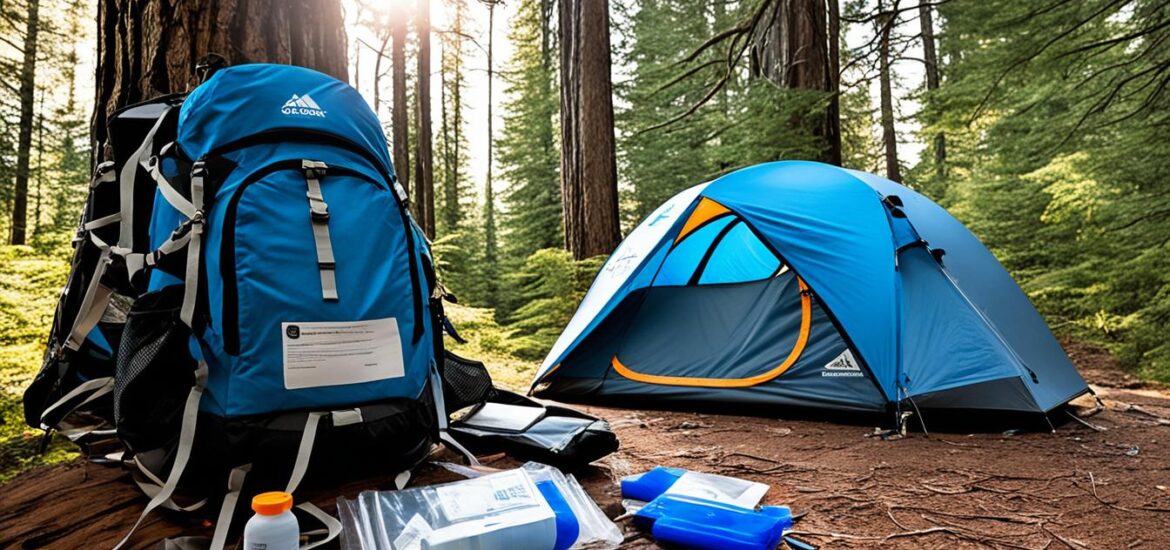As a nature enthusiast, I am always on the hunt for biodegradable outdoor gear that allows me to commune with our stunning outdoors without leaving a destructive mark. It’s refreshing to see eco-friendly camping equipment becoming mainstream as outdoor enthusiasts warmly welcome inventions that safeguard the lovely nature we all treasure. Lately, several sustainable outdoor companies, including Kammok, NEMO Equipment, and The North Face, have pledged to use eco-friendly resources, such as 100% recycled yarns and bluesign® approved materials, in their products. Sustainable hiking gear helps protect the environment and extends the lifespan of your equipment.
Outdoor brands are increasingly using eco-friendly materials and endorsing sustainably produced products. Durable gear made from recycled or ethical materials is beneficial for both nature and outdoor enthusiasts. Promoting reduced waste, brands like Klean Kanteen offer alternatives like vacuum-insulated stainless steel water bottles. Patagonia and other companies not only create eco-friendly gear but also support a sustainable lifestyle through their dedication to circularity. Embracing biodegradable camping gear contributes to a healthier environment and more sustainable outdoor adventures.
Key Takeaways
- Sustainable outdoor gear helps protect the environment and extends the lifespan of your equipment.
- Outdoor brands are using eco-friendly materials and endorsing sustainably produced products.
- Biodegradable camping gear contributes to a healthier environment and more sustainable outdoor adventures.
- Brands like Klean Kanteen offer alternatives to reduce waste, such as vacuum-insulated stainless steel water bottles.
- Patagonia and other companies support a sustainable lifestyle through their dedication to circularity.
Embracing Nature’s Call: The Rise of Sustainable Adventure Wear
There’s no better way to enjoy the great outdoors than with sustainable outdoor clothing brands that put people and planet first. Before you grab your eco-friendly water bottle, air out that old tent, and squeeze everything into your sustainable backpack, consider what you’re bringing into Momma Earth’s house. From eco-friendly hiking pants to sweatshirts that won’t sweat the planet, we’ve collected together our favorite sustainable outdoor clothes for responsible adventuring.
Eco-Friendly Outdoor Apparel: A Conscious Choice
Everything we recommend to you on Sustainable Jungle is independently researched and we ask all brands to confirm their claims. To avoid waste, we test products on an as needed basis. tentree gets an (alpen)glowing review for its supply chain transparency, eco-friendly materials, and stellar tree planting efforts. We’ve always been a big fan of Patagonia, who sticks to regenerative organic cotton and mostly recycled synthetics instead of virgin ones in their more technical garments. Outdoor brands are increasingly using eco-friendly materials and endorsing sustainably produced products. Durable gear made from recycled or ethical materials is beneficial for both nature and outdoor enthusiasts.
Biodegradable Gear: Safeguarding Our Natural Playgrounds
Outdoor brands are increasingly using eco-friendly materials and endorsing sustainably produced products. Durable gear made from recycled or ethical materials is beneficial for both nature and outdoor enthusiasts.
Biodegradable Outdoor Gear: Safeguarding the Great Outdoors
When it comes to camping, it’s important to choose gear that not only meets your needs but also minimizes your environmental impact. Here are some biodegradable camping gear options for eco-conscious outdoor enthusiasts, grouped into sections based on the items.
Tents made from recycled materials: Many brands now offer tents made from recycled materials, such as recycled polyester or recycled nylon. For example, the Big Agnes Copper Spur HV UL Tent is made from recycled ripstop nylon and has a footprint of only 2.5 lbs, making it lightweight and eco-friendly.
Biodegradable tent stakes: Instead of traditional plastic or metal tent stakes, consider biodegradable options made from materials like bamboo or wood. These will naturally decompose over time, reducing waste.
Recycled insulation sleeping bags: Look for sleeping bags filled with recycled insulation, such as recycled down or synthetic fibers. The Marmot Trestles Elite Eco 20 Sleeping Bag is made with recycled materials and is treated with a durable water-repellent finish.
Biodegradable sleeping pads: Some brands offer sleeping pads made from biodegradable materials like plant-based foam or natural rubber. The Therm-a-Rest NeoAir XLite Sleeping Pad is made from recycled materials and is designed to be lightweight and compact.
Proper care and storage of your sleeping gear can extend its lifespan, reducing the need for frequent replacements and minimizing waste.
Organic Cotton: The Sustainable Fabric of Adventure
In the realm of sustainable adventure wear, organic cotton plays a vital role in promoting eco-friendly practices. This natural fiber not only benefits the environment but also offers superior quality and comfort to outdoor enthusiasts. Organic cotton is grown without the use of harmful pesticides and chemicals, making it safer for farmers, consumers, and the environment. By avoiding genetically modified seeds and chemical fertilizers, organic cotton cultivation helps maintain biodiversity in agricultural lands.
Benefits of Organic Cotton for Outdoor Clothing
Organic cotton cultivation requires less water compared to conventional cotton, contributing to water conservation efforts globally. Organic cotton garments tend to be softer, more breathable, and less likely to cause skin allergies compared to conventional cotton counterparts. Choosing clothing made from organic cotton contributes to the preservation of natural resources and supports a more sustainable fashion industry.
GOTS Certification: Ensuring Quality and Accountability
The Global Organic Textile Standard (GOTS) sets strict criteria for organic textiles, from harvesting the raw materials to environmentally and socially responsible manufacturing. Adhering to these standards ensures transparency and credibility in the production of sustainable adventure wear. Conventional cotton production is known to have a significant ecological footprint due to pesticide use and water consumption.
| Conventional Cotton | Organic Cotton |
|---|---|
| Uses synthetic pesticides and fertilizers | Grown without harmful chemicals |
| High water consumption | Requires less water |
| Potential skin irritation | Softer, more breathable, hypoallergenic |
| Negative environmental impact | Supports biodiversity and sustainability |
Fair Trade Practices: Ethical Outdoor Wear for Conscious Explorers
In the realm of sustainable adventure wear, fair trade practices play a significant role in promoting ethical production methods and supporting the well-being of workers within the clothing industry. The Fair Share Project ensures that all individuals involved in the production and manufacturing of Biodegradable Outdoor Gear, Eco-friendly Camping Equipment, Sustainable Hiking Gear, Green Adventure Apparel, Compostable Travel Essentials, Natural Fiber Backpacks, Organic Tents, Plant-based Rain Jackets, and Bio-sourced Outdoor Clothing receive a fair percentage of the sales generated by each item sold.
The Fair Share Project: Empowering Clothing Workers
This approach aims to redistribute profits equitably among workers, ultimately increasing their monthly earnings and improving their standard of living. Fair trade practices empower workers by providing them with fair wages, safe working conditions, and opportunities for personal and professional development.
Supporting Fair Trade: A Commitment to Social Responsibility
By supporting fair trade clothing brands, consumers contribute to the development of communities where production takes place, fostering sustainable growth and social well-being. Fair trade certifications ensure transparency in the supply chain, holding brands accountable for their ethical commitments and treatment of workers. By choosing sustainable adventure wear from fair trade brands, consumers not only invest in high-quality, ethically made products but also support a more equitable and just fashion industry.
Low Carbon Footprint: Minimizing Environmental Impact
Lowering carbon emissions in the manufacturing of sustainable biodegradable outdoor gear, eco-friendly camping equipment, sustainable hiking gear, green adventure apparel, compostable travel essentials, natural fiber backpacks, organic tents, plant-based rain jackets, and bio-sourced outdoor clothing not only benefits the environment but also serves as a key factor in combatting climate change. By implementing eco-friendly practices, brands can mitigate their carbon footprint and set a positive example for the industry.
Renewable Energy in Clothing Manufacturing
Many sustainable clothing brands are investing in solar energy to power their manufacturing facilities, reducing reliance on fossil fuels and decreasing greenhouse gas emissions. Utilizing wind turbines and harnessing the power of flowing water to generate electricity for production processes are other sustainable practices adopted by eco-conscious clothing companies.
Sustainable Transportation: Reducing Emissions
Choosing shipping methods such as sea freight over air transport significantly reduces carbon emissions associated with long-distance transportation. Prioritizing local suppliers and manufacturers helps minimize the carbon footprint of transportation by reducing the distance goods need to travel. Implementing efficient logistics strategies, such as consolidating shipments and optimizing routes, further reduces the environmental impact of transportation in the clothing industry.
By embracing low carbon footprint practices in sustainable adventure wear production and distribution, brands can play a significant role in mitigating climate change and fostering a more sustainable future for the apparel industry and the planet as a whole.
Sustainable Innovation: Brands Leading the Way
With a growing awareness of environmental issues, more outdoor clothing brands are committing to increasing the sustainability of their products by utilizing eco-friendly materials, reducing waste, and supporting ethical labor practices. Brands focusing on sustainable adventure wear are dedicated to continual improvement, seeking innovative ways to minimize their ecological footprint and promote environmental stewardship.
Patagonia: A Pioneer in Sustainable Outdoor Wear
Patagonia stands out as a pioneer in sustainable outdoor wear, with a commitment to circularity, offering repaired and upcycled pieces along with its array of eco-friendly items. The brand uses a range of SJ-approved fabrics, including organic cotton, lyocell, hemp, RWS-certified wool, recycled cotton, recycled polyester, and Lenzing modal. Many of Patagonia’s fabrics are bluesign® approved and OEKO-TEX-certified. As a Certified B Corp and an accredited member of the Fair Labor Association, Patagonia supports over 75,000 workers in its Fair Trade Certified factories.
Emerging Brands: Innovative Solutions for Eco-Conscious Adventurers
Emerging brands like tentree and Toad&Co are also leading the charge in innovative solutions for eco-conscious adventurers, offering a wide range of sustainable outdoor clothing options. These brands are dedicated to using biodegradable, eco-friendly, and sustainable materials in their camping equipment, hiking gear, and adventure apparel, providing green and compostable alternatives for the conscious outdoor enthusiast.

Biodegradable Outdoor Gear: A Comprehensive Guide
As outdoor enthusiasts, we have a responsibility to minimize our environmental impact while enjoying nature’s wonders. Fortunately, the world of biodegradable outdoor gear offers a wealth of eco-friendly solutions to consider. From tents and shelters to sleeping bags and backpacks, let’s dive into the sustainable options that can make your adventures both rewarding and responsible.
Tents and Shelters: Eco-Friendly Camping Solutions
Tents made from recycled materials are now becoming more prevalent in the market. Companies like Big Agnes offer the Copper Spur HV UL Tent, crafted from recycled ripstop nylon and weighing just 2.5 lbs, providing a lightweight and eco-friendly camping solution. Additionally, biodegradable tent stakes made from materials like bamboo or wood are a sustainable alternative to traditional plastic or metal options, as they will naturally decompose over time.
Sleeping Bags and Pads: Sustainable Comfort for Outdoor Explorers
When it comes to sleeping gear, look for recycled insulation sleeping bags filled with materials like recycled down or synthetic fibers. The Marmot Trestles Elite Eco 20 Sleeping Bag, for instance, is made with recycled materials and features a durable water-repellent finish. Similarly, biodegradable sleeping pads constructed from plant-based foam or natural rubber offer a comfortable and eco-conscious alternative to traditional options.
Backpacks and Accessories: Carrying Your Adventures Responsibly
Backpacks and accessories crafted from recycled materials are another way to reduce your environmental impact while on the trail. The Patagonia Black Hole Backpack, for example, is made using recycled fabrics, providing a sustainable option for carrying your outdoor gear. By choosing natural fiber backpacks, organic tents, and other biodegradable outdoor gear, you can embrace a more eco-friendly and sustainable approach to your adventures.
Caring for Your Biodegradable Gear: Maximizing Longevity
Proper care and storage of your biodegradable outdoor gear, such as eco-friendly camping equipment and sustainable hiking gear, can extend its lifespan, reducing the need for frequent replacements and minimizing waste. By embracing a circular mindset and maintaining your green adventure apparel and compostable travel essentials, you can maximize the longevity of your natural fiber backpacks, organic tents, and plant-based rain jackets.
Proper Maintenance: Extending the Life of Your Outdoor Equipment
Caring for your bio-sourced outdoor clothing and equipment is essential to ensuring its long-term durability and performance. Regularly cleaning and conditioning your biodegradable outdoor gear can help preserve its quality and prevent premature wear and tear. Follow the manufacturer’s instructions for proper cleaning and storage techniques to keep your sustainable camping gear in top condition.
Repair and Upcycling: Embracing a Circular Mindset
Leading brands like Patagonia are at the forefront of the circular economy, offering repair and upcycling services to help keep their eco-friendly camping equipment and sustainable hiking gear in circulation for longer. By embracing a circular mindset and extending the lifespan of your biodegradable outdoor gear, you can reduce your environmental impact and contribute to a more sustainable future for outdoor adventures.

By properly maintaining your outdoor equipment and embracing a circular approach, you can maximize the longevity of your biodegradable gear and reduce your environmental impact, ensuring your adventures leave a lighter footprint on the green adventure apparel and compostable travel essentials you cherish.
The Future of Sustainable Adventure: Collective Responsibility
With a growing awareness of environmental issues, more outdoor clothing brands are committing to increasing the sustainability of their products by utilizing eco-friendly materials, reducing waste, and supporting ethical labor practices. Brands focusing on sustainable adventure wear are dedicated to continual improvement, seeking innovative ways to minimize their ecological footprint and promote environmental stewardship.
Consumer Education: Raising Awareness for Conscious Choices
By raising awareness about the importance of sustainable adventure wear and the benefits of eco-conscious choices, brands can empower consumers to make informed decisions that align with their values. Educating the public on the environmental impact of their purchasing decisions and the availability of biodegradable outdoor gear, eco-friendly camping equipment, and sustainable hiking gear can inspire a shift towards more responsible consumption.
Industry Collaboration: Driving Change Through Partnerships
Industry collaboration is also crucial in driving change, as outdoor brands team up with environmental organizations to further promote sustainability and raise awareness about the importance of conscious consumption. Through joint initiatives, workshops, and advocacy efforts, the industry can collectively champion the adoption of green adventure apparel, compostable travel essentials, and natural fiber backpacks, among other sustainable solutions.
Biodegradable Outdoor Gear: Embracing a Sustainable Lifestyle
By supporting brands that prioritize sustainability, we can contribute to a more sustainable and ethical fashion industry. Embracing biodegradable outdoor gear and adopting a sustainable lifestyle while adventuring can have a significant impact on the environment.
Reducing Your Environmental Footprint on Adventures
Reducing your environmental footprint on adventures, such as by using biodegradable camping gear, minimizing waste, and supporting ethical outdoor brands, is an essential step in preserving nature for future generations. Eco-friendly camping equipment and sustainable hiking gear can help you leave no trace during your outdoor excursions.
Responsible Recreation: Preserving Nature for Future Generations
Responsible recreation, where we prioritize the well-being of the natural world, is crucial in creating a greener future for outdoor exploration. By choosing green adventure apparel, compostable travel essentials, and natural fiber backpacks, we can enjoy the great outdoors while minimizing our impact on the environment. Embracing organic tents, plant-based rain jackets, and bio-sourced outdoor clothing demonstrates our commitment to preserving the beauty and integrity of our natural playgrounds.


